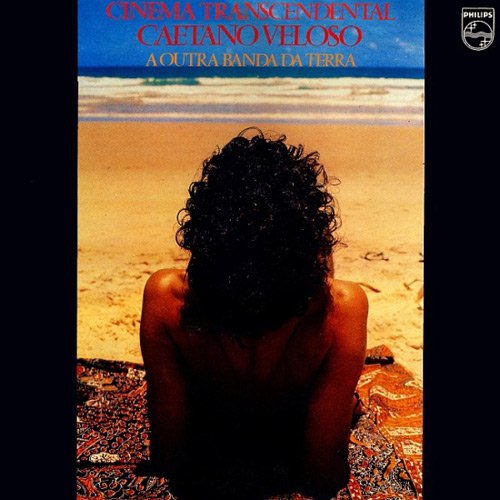Caetano Veloso found his bliss in the organic acoustic grooves of this soothing and sensual mystical meditation. 'Cinema Transcendental' shows Velose and A Outra Banda da Terra cooling the afro-jazz rhythms of 'Bicho' and the sultry samba of 'Muito (dentro da estrela azulada)' into a more subtle sound while still experimenting with different genres and forms.
The sessions were produced and engineered by Paulo Chocolate and Luis Claudio Coutinho with Caetano Veloso on production, acoustic guitar, whistle, palmas, percussion, and vocals; Tony Costa and Perinho Santana on guitar; Tomás Improta on keyboards, arrangements, claves, bamboo flute, palmas, percussion, and vocals; Arnaldo Brandão on bass, palmas, percussion, and vocals; Vinícius Cantuária on drums and steel guitar; Bolão on percussion, palmas, and vocals; and Dominguinhos on accordion; with Lúcia Turnbull and Marizinha on choir.
Veloso would expound at the time: "The sung word is, in sum, another type of raw material that is related to the written word and the spoken word, but that cannot be reduced to either. The sung word works, perhaps, as a synthesis of the other two; it has performed at least that function. Enjoying the word in a state of poetry has always been more intense in the arena of popular music that in the others. Perhaps this phenomenon has to do a bit with fatigue, fatigue of the visual, of visual communication, of reading. At the end of the 1960s, McLuhan’s talk about that stuff was perhaps an indication of such a fatigue. The visual failed. The ear is something much more absorbing, more participatory. Sound comes from everywhere; it penetrates every pore. Perhaps such a fatigue is temporary. Things come and go. I don’t believe that things go forward, as if there could be a kind of progress. I don’t share the Western idea of linear progress...Brazilian popular music is, in all senses of the word, very abundant. It is the only artistic expression in Brazil that is not poor. In reality, it is an aberration in Brazilian society: it’s different. Nowhere in the world does popular music matter as much as it matters here. Popular music always manages to support itself, always manages to get enough resources to stay strong, something that doesn’t happen with written poetry, with film, with theater. It generates push, national pride. It has the mission of expressing the country. A generation like mine, with Jorge Ben, Gilberto Gil, Chico Buarque, Paulinho da Viola, only managed to succeed because other good people were there before. Not even in the United States is popular music as strong as it is here, because Americans also have other things. 'There they have money, cars, lawns, food / all of that is cool,' to quote a verse from Paulo Leminski. Brazilians are very poor; they don’t manage to get together to get anything done. But in the midst of such chaos, popular music somehow works. Popular music is the philosophical expression of the country. It is much more important than all the college-educated people of all ages who already wrote about all the complicated things in the world. Popular music is a more totalizing expression of Brazil, a more direct one. It doesn’t mess with noble materials because Brazil is not a noble country. I believe that the 'paper' poets are in a more general way linked to a European tradition, and popular music is something more linked to the Americas. When it appeared, the Americas were already around. In that way, it is somewhat like cinema, and, at the same time, it is music because it is a very old thing."
http://www.caetanoveloso.com.br/
'Cinema Transcendental'
full album:
00:00 Lua de São Jorge
03:57 Oração ao Tempo
07:24 Beleza Pura
10:54 Menino do Rio
13:22 Vampiro
17:26 Elegia [adaptado de poema de John Donne]
19:45 Trilhos Urbanos
22:31 Louco Por Você
30:10 Cajuína
32:30 Aracaju
34:54 Badauê,
36:27 Os Meninos Dançam
1. "Moon of St. George" 3:57
2. "Prayer at the Time" 3:25
3. "Pure Beauty" 3:30
4. "River Boy" 2:28
5. "Vampire" Jorge Mautner 4:03
6. "Elegy" Pericles Cavalcanti and Augusto de Campos 2:19
7. "Urban Trails" 2:46
8. "Crazy for You" 7:40
9. "Cajuína" 2:20
10. "Aracaju" Thomas Improta, Canterbury Vinicius Caetano Veloso and 2:23
11. "Badauê" Môa the Catende 1:32
12. "The Dancing Boys" 3:14


No comments:
Post a Comment